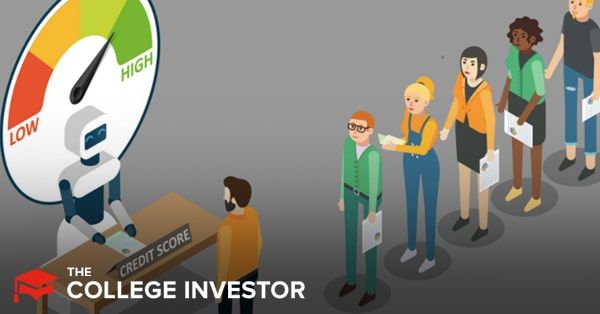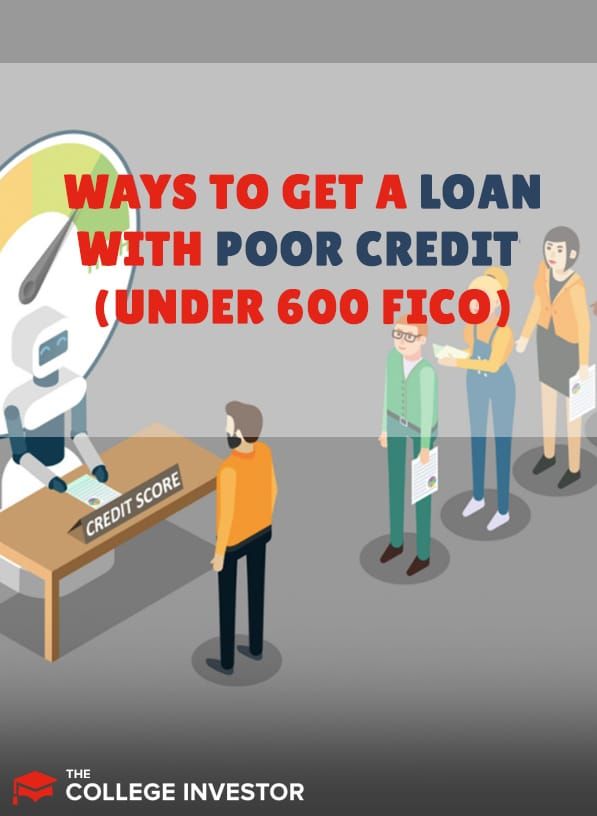
It's not always easy, but it's possible to get a loan with poor credit, meaning a 600 credit score or less.
A credit score is a numeric representation of a bank’s willingness to lend you money. It is calculated based on your interactions with credit. When you pay a loan on time, your score increases. When you miss payments or fall into default it decreases.
There are many types of credit scores, but one of the most popular is the FICO 8 credit score, which has a range from 300-850. A score above 700 is generally considered Good and a score below 600 is often considered Poor.
It can be more difficult to get a loan with poor credit score because bad credit loans pose a greater risk for lenders. Banks may be unwilling to lend this person money, or they may only qualify for loans with very high interest rates. People with bad credit can also fall into predatory loan schemes that ultimately trap borrowers in debt cycle.
However, with some extra research and effort, you could save yourself a lot of money on bad credit loans. Keep reading to learn how to get a personal loan, credit card, auto loan, or mortgage loan with poor credit.
Easiest Loan To Get: Cash Advance Loan
If you have a poor credit score of 600 or less, the easiest loan that you can get is a cash advance loan. These loans will offer you anywhere from $100 to $500 or more, but they require you to use their banking app, and link your account.
The reason? They're going to scan your account, and offer you a cash advance based on past paychecks you've received. It's not always great, but it's an easy way to get started if you need a loan for a small amount.
Main providers:
Get A Personal Loan With Poor Credit
You have a few options if you’re looking to get a personal loan with poor credit. First, if you’re looking to borrow a small amount and you happen to be a credit union member, you may want to consider applying for a Payday Alternative Loan (PAL).
You can borrow $20 to $200 with a PAL with loan terms that range from 1 to 6 months. And unlike payday loans, you’ll never pay more than $20 in fees with a Payday Alternative Loan.
If you’re not a credit union member or you need to borrow a larger amount, you’re next best may be to apply with a peer-to-peer lender. P2P lenders are known for having more lenient credit score requirements than traditional lenders. If you’re looking to compare quotes, you may want to start with Prosper and Lending Club.
Related: The Best Personal Loan Companies And Online Lenders
Getting A Credit Card With Poor Credit
Many credit card issuers won’t offer credit cards to people with poor credit. However, there are three types of credit cards that people with credit problems can reliably obtain. These cards aren't typically strong on the rewards front, but they can serve to help you build credit.
- Secured credit cards: With a secured credit cards, the cardholder puts down a deposit (say $300) to qualify for a line of credit (say $500). If the cardholder fails to make a payment, the credit card company can keep their deposit. In exchange, these card's typically come with relaxed credit requirement. The best secured credit cards have no fees and may even offer a small cashback reward.
- Retail credit cards: If you’ve got a stable income, you may qualify for a gas station Card, a Target RedCard, or other forms of retail financing. Normally, these credit cards offer mediocre rewards, but they can help you build credit. Just be sure to use them responsibly.
- Unsecured credit-builder cards: Certain cashback cards such as the Discover it® Student Chrome are cashback cards designed for students. Other credit-building cards such as the Indigo® Platinum Mastercard® are open to anyone. However, many unsecured cards for bad or limited credit do charge an annual fee.
How To Get An Auto Loan With Poor Credit
If you’ve got a bad credit history, auto financing can be an absolute minefield. Buy Here, Pay Here dealerships often prey on people who are desperate for financing and any vehicle.
Right now, people with very bad credit pay an average interest rate of 20.45% APR on used cars according to Experian's latest State of the Automotive Finance Market report. People with great credit, on the other hand, pay just 4.29% APR on average.
Whenever possible, avoid financing a vehicle while you have bad credit. But if you must get an auto loan with poor credit, follow these tips.
- Don't allow yourself to get fleeced on the value of a car. Take a car to a trusted mechanic to get an inspection before you buy any used vehicle. Use online tools like Kelly Blue Book or Edmunds to estimate the value of the vehicle.
- Apply for loans at a local credit union or bank. If you're pre-approved for a loan at a local bank or credit union, you can avoid slimy dealership financing deals. Plus, when you’re approved in advance, you'll know which car prices fit in your budget. You may also want to use a loan marketplace like LendingTree to find options nationwide.
- Follow the 20/4/10 rule when buying a car. Aim to put at least 20% down, take out a loan for four years or less, and keep your monthly payment below 10% of your income or less.
Related: How To Buy A Car With Student Debt
How To Get A Mortgage Loan With Poor Credit
If your credit score is below 620, you unfortunately won’t qualify for a conventional mortgage. However, you may qualify for government-backed loans such as FHA or USDA mortgages. Even with these options, it can be still be hard to get a mortgage with bad credit. According to the Urban Institute, only 10% of mortgage borrowers have credit scores below 656.
The easiest way to qualify for a mortgage with bad credit is to have a spouse with a high income and great credit. If your spouse can qualify for a mortgage on their own, you can sign onto the deed. Then you can contribute to the home payments and participate in the growth in equity.
If you’re trying to qualify on your own (or your income is needed to make the payments), an FHA loan may be your best option. This loan allows borrowers to qualify for loans with scores as low as 500. You may end up with a high interest rate, but it’s likely to be manageable.
Due to COVID-19, refinancing a mortgage may be easier than in previous years. Many lenders are offering options for streamlined mortgage refinancing right now, even for borrowers with poor credit.
Student Loans With Bad Credit
If you have bad credit and need a student loan, you're potentially in luck! Undergraduate federal student don't require any type of credit history or credit score, but student loan limits are low.
However, if you just need a small loan for your education, federal student loans are the best choice. They offer great repayment plan options, and even loan forgiveness.
If you are looking for a private loan, you won't qualify with a low FICO score. You will need a cosigner with good credit to qualify.
Read our full guide to getting a student loan with bad credit.
Avoid Bad Credit Loan "Gotchas"
People with bad credit can wind up with even worse financial problems if they aren’t wary of lenders tactics. Below are three bad credit gotchas to avoid.
- Putting Your Car Title On Hook For Your Loan. Title loans are a horrible form of debt that could lead to you losing your car. Most people who take out a title loan have to "re-up" the loan several times before they manage to pay it off. Don’t get trapped by these awful loans.
- Taking Out A Loan With A Payday Lender. It's nearly impossible to climb out of a payday loan vortex, so it’s better to bypass it altogether. If a payday loan is your only financing choice, you may need to look into other options for paying your bills like delaying payment or creating a Debt Management Plan (DMP) with a credit counselor.
- Pay To Improve Your Credit Score. Shady “credit repair” firms will offer to repair your credit in exchange for a fee. But these firms can't do anything that you cannot do yourself. Often, they’ll dispute every charge on your credit report only for the credit bureaus to say that everything is valid.
Fix Your Credit Before Applying For A Loan
Many young adults (especially college students) have a short credit history. When you pair that with a few credit mistakes (such as late payments, a loan in default, or an unpaid cell phone bill in collections), it’s easy to have a credit score below 600.
But young people should not despair about poor credit. Time and responsible credit behavior makes it possible to restore your credit in a few years (or even less). These are the steps you can take today to raise your credit score.
- Pay all your current accounts on time. Make at least the minimum monthly payments (and preferably more) on all your debt by the due date each month. This is the number one thing you can do to boost your credit score.
- Improve your credit utilization rate. Credit utilization is the amount of debt you owe relative to your available credit limit. A lower utilization ratio is better for your credit score. So reducing your monthly credit card spending can improve your credit utilization rate and boost your score.
- Dispute errors on your credit report. If you’ve had a bill in collections, there is likely to be an error on your credit report. The errors tend to happen when a bill is sold to collections agents. The CFPB provides step-by-step guidance on how to identify and dispute incorrect information on your credit report.
- Avoid applying for credit when you don’t need it. Applying for a lot of new credit at the same time will hurt your credit score. It makes you look desperate and banks may become even less likely to issue a loan to you. Before you take out a new loan, try to avoid applying for any new credit other than the loan you need.
Final Thoughts On Getting A Loan With Poor Credit
Getting a loan with poor credit isn’t always easy, but it's also not impossible. Borrowers with poor credit must be extra vigilant to price-shop and find the best financing deals. To make sure that you're getting the best rates available, consider using a loan comparison marketplace like Lending Tree.

Robert Farrington is America’s Millennial Money Expert® and America’s Student Loan Debt Expert™, and the founder of The College Investor, a personal finance site dedicated to helping millennials escape student loan debt to start investing and building wealth for the future. You can learn more about him on the About Page or on his personal site RobertFarrington.com.
He regularly writes about investing, student loan debt, and general personal finance topics geared toward anyone wanting to earn more, get out of debt, and start building wealth for the future.
He has been quoted in major publications, including the New York Times, Wall Street Journal, Washington Post, ABC, NBC, Today, and more. He is also a regular contributor to Forbes.
Editor: Clint Proctor Reviewed by: Ashley Barnett
